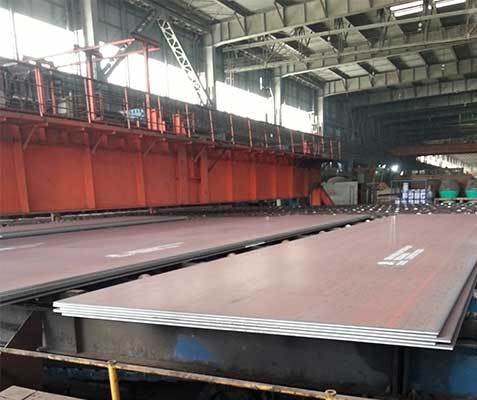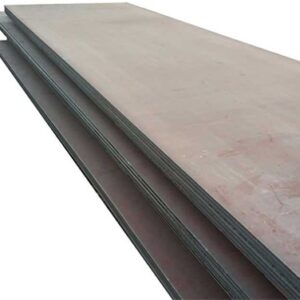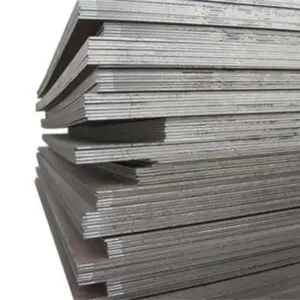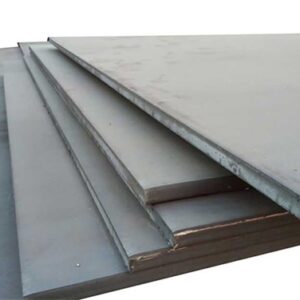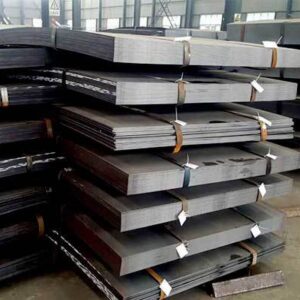Brief introduction of marine steel plate
Marine steel plate refers to structural steel used in ship building. It is considered a marine grade and must be able to resist corrosive effects that are common in a water environment. To achieve this, special alloying elements are added to these grades in order to defend agaist corrosion.While most carbon steel is not suited for marine environments, there are several marine grade carbon steels that have been approved by the different societies for shipbuilding applications.
Structural steel for ship hulls is divided into strength classes according to its minimum yield strength: general strength structural steel and high strength structural steel. Maine steel plate refers to hot rolled steel plate produced in accordance with the requirements of the classication society for the construction of ship hull structures.
There are 9 main classification societies in worldwide.
A.B.S American Bureau of Shipping
B.V. Bureau Veritas
C.C.S. China Classification Society
D.N.V Det Norske Veritas
G.L. Germanischer Lloyd
K.R. Korean Register of Shipping
L.R. Lloyd’s Register of Shipping
N.K. Nippon Kaiji Kyokai
R.I.N.A Registro Italiano Navale
Grade AH36 steel is the impact force subjected to 0 ° C
Grade DH36 steel impact force at -20 ° C
Grade EH36 steel impact force at -40 ° C
Grade FH36 steel impact force at -60 ° C
Shot blasting service
Shot blasting is a method used to clean or polish steel when enhanced surface finishes are required. Shot blasting is used in almost every industry we serve. Especially in shipbuilding, rail,structural fabrication and more.
Specifications range
Thickness:2.5-120mm
Width:1000-3000mm
Length: As request
Chemical composition and mechanical properties
Chemical Composition
| Steel grade | C | Si | Mn | P | S | Als |
| Grade AH36 | ≤0.18 | ≤0.50 | 0.9-1.6 | ≤0.035 | ≤0.035 | ≥0.015 |
| Grade DH36 | ≤0.18 | ≤0.50 | 0.9-1.6 | ≤0.035 | ≤0.035 | ≥0.015 |
| Grade EH36 | ≤0.18 | ≤0.50 | 0.9-1.6 | ≤0.035 | ≤0.035 | ≥0.015 |
| Grade FH36 | ≤0.18 | ≤0.50 | 0.9-1.6 | ≤0.035 | ≤0.035 | ≥0.015 |
Processing for Different Grades
Grade D, E (DH32, DH36, EH 32, EH 36)
Grade D and E series (inlcuding AH32/36, DH32, DH36, EH32, EH36) shipbuilding steel plates require good low temperature toughness and good welding performance. The production high-strength shipbuilding steel plate needs to be normalized by means of controlled rolling and controlled cooling or heat treatment processes with more complete equipment. At the same time, the internal steel purity of the supplied billets is required to be high, especially the content of S, P, N, 0 and H in the steel should be strictly controlled.
Alloy Elements Added to Improve Toughness
In order to ensure the performance of high-strength ship plates, micro-alloying technology is adopted. By adding Nb, V, Ti and other alloying elements to the steel, combined with the controlled rolling process, the grain is refined and the toughness is improved.
Direction of Development for Shipbuilding Plate
High strength, high specification, with the ship’s large-scale and safety, and changes in coating specifications, the demand for ordinary A-class panels is gradually reduced, and the demand for high-strength panels is increasing, which is concentrated in large ships of 5m wide. Plate, 200-300mm thickness special thick ship board.
Mechanical Properties
| Steel grade | Yield point/MPa | Tensile point /MPa | Elongation/% | Temperature/° C | V-type impact test | ||
| Akv/J | |||||||
| ≤50MM | 50-70MM | 70-100MM | |||||
| Grade AH36 | ≥355 | 490-630 | ≥21 | 0 | 34/24 | 41/27 | 50/34 |
| Grade DH36 | ≥355 | 490-630 | ≥21 | -20 | 34/24 | 41/27 | 50/34 |
| Grade EH36 | ≥355 | 490-630 | ≥21 | -40 | 34/24 | 41/27 | 50/34 |
| Grade FH36 | ≥355 | 490-630 | ≥21 | -60 | 34/24 | 41/27 | 50/34 |

